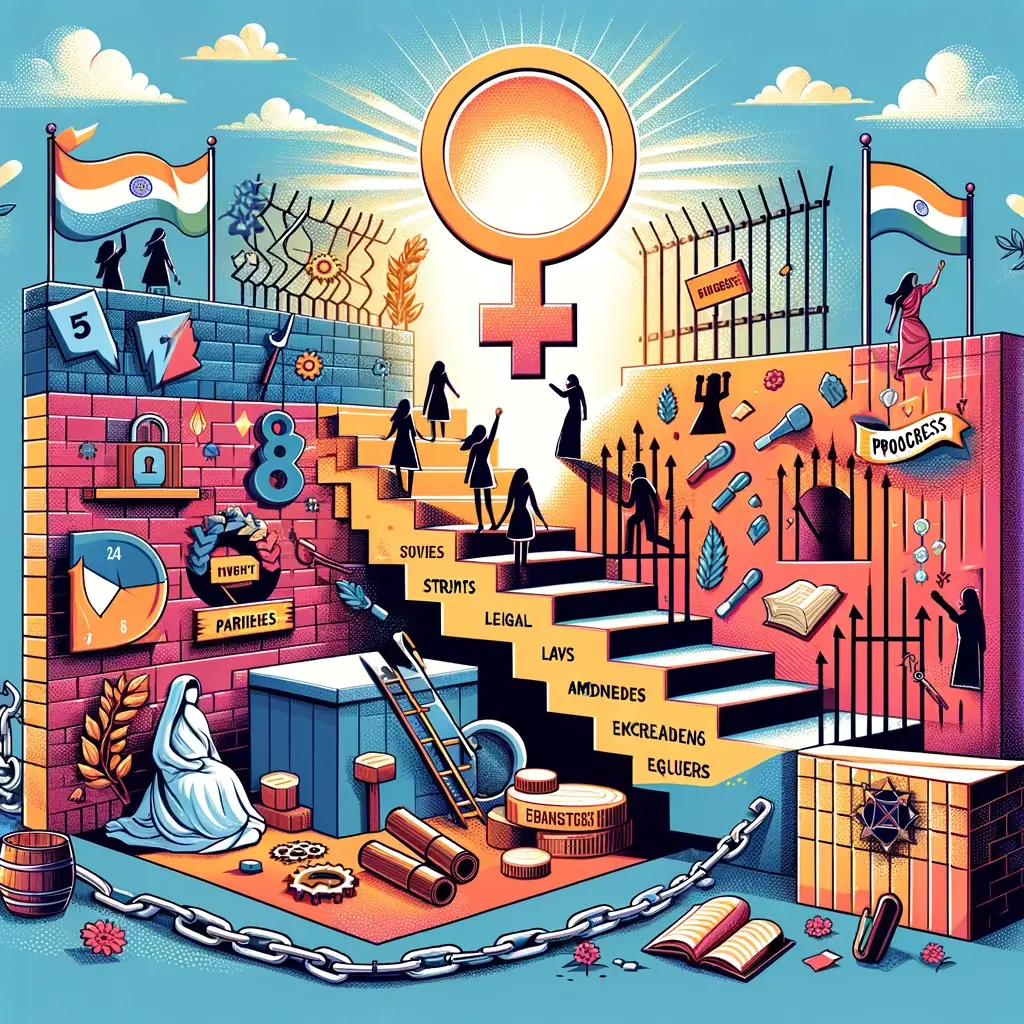This article talks about Women’s Property Rights In India.
Introduction

In India, the journey towards gender equality has been long and arduous, especially when it comes to property rights. Over the years, legislative reforms and judicial pronouncements have played a pivotal role in enhancing the property rights of women. This article aims to provide a clear and comprehensive overview of women’s property rights in India, shedding light on the significant milestones and current legal provisions.
Women’s Property Rights in India: A Comprehensive Guide
Historical Context
Historically, women in India were often sidelined when it came to inheritance and ownership of property. This discrimination was not just a legal issue but deeply entrenched in societal norms and practices. However, the post-independence era brought about a wave of change, with the Indian legal system gradually evolving to recognize and protect the property rights of women.
The Legal Framework
The Hindu Succession Act, 1956, and Its Amendments
The 1956 Act
The Hindu Succession Act, 1956, was a groundbreaking law that marked the beginning of a new era for Hindu women’s property rights. It provided women with the right to inherit ancestral property, albeit with certain limitations.
The 2005 Amendment
A landmark amendment in 2005 further strengthened women’s rights by giving daughters equal rights as sons in the inheritance of ancestral property. This amendment was a significant step forward in ensuring gender equality in property rights among Hindus.
Other Relevant Laws
- The Indian Succession Act, 1925: Governs the property rights of Christians, Parsis, and those who are not covered under specific religious laws.
- The Muslim Personal Law (Shariat) Application Act, 1937: Dictates property rights under Islamic law, allowing Muslim women to inherit property but with shares typically half that of male counterparts.
Special Considerations
- Marital Property: Laws relating to marital property, including the Protection of Women from Domestic Violence Act, 2005, recognize women’s rights to reside in the matrimonial home, although they do not automatically confer ownership.
- Streedhan: Under Hindu law, Streedhan refers to gifts and property given to a woman at the time of her marriage or throughout her life, which she is entitled to use and control entirely.
Challenges and Progress

Despite the robust legal framework, the implementation of these laws faces several challenges. Social norms and practices often hinder the full realization of women’s property rights. However, there have been numerous instances where the judiciary has stepped in to protect and enforce these rights, showcasing a progressive trend towards gender equality.
Personal Stories:
The story of Sunita (original name hidden), a middle-aged woman from a small village in Rajasthan, illustrates the transformative impact of these laws. After her father’s death, Sunita fought a lengthy legal battle against her relatives to claim her rightful share of the family property. Her victory was not just a personal triumph but also a beacon of hope for many women facing similar struggles. Sunita’s story emphasizes the importance of awareness and legal literacy among women regarding their property rights.
Conclusion
Women’s property rights in India have come a long way, with laws increasingly aligning with the principles of gender equality. However, the journey is far from over. Continuous efforts are needed to ensure that these rights are not just on paper but are realized in practice. It is essential for women to be aware of their legal rights and for society to support and uphold these rights, ensuring a future where gender no longer dictates one’s right to property.
FAQs on Women’s Property Rights in India
1. Do women in India have equal rights to inherit property?
Yes, women in India have equal rights to inherit property under laws like the Hindu Succession Act, 1956, especially after the 2005 amendment, which gave daughters equal rights as sons in inheriting ancestral property.
2. Can a Muslim woman inherit property in India?
Yes, Muslim women are entitled to inherit property under the Muslim Personal Law (Shariat) Application Act, 1937, although their share is typically half of what male heirs receive.
3. What is Streedhan, and who controls it?
Streedhan refers to gifts and property given to a woman at the time of her marriage or throughout her life. The woman has full control and ownership of her Streedhan.
4. Are daughters entitled to inherit property equally with sons?
In Hindu law, after the 2005 amendment to the Hindu Succession Act, daughters have the same rights as sons to inherit ancestral property.
5. What happens if a woman’s husband dies without leaving a will?
If a woman’s husband dies intestate (without leaving a will), the property is divided according to the respective succession laws applicable to their religion, where the wife is one of the primary heirs.
6. Can a widow be dispossessed of her husband’s property?
No, a widow has a right to her deceased husband’s property under Indian law and cannot be legally dispossessed of it.
7. Do women have a right to their father’s property after marriage?
Yes, married daughters have the same right to their father’s property as unmarried daughters, especially under the Hindu Succession Act, after the 2005 amendment.
8. What is the Protection of Women from Domestic Violence Act, 2005, and how does it relate to property rights?
The Protection of Women from Domestic Violence Act, 2005, provides protection to women from domestic violence and recognizes the right of women to reside in the matrimonial or shared household, though it does not automatically confer ownership rights.
9. Can a woman ask for partition in ancestral property?
Yes, a woman (daughter) can ask for partition in ancestral property on par with male heirs under the Hindu Succession Act, 2005 amendment.
10. What is the matrimonial property, and how is it divided upon divorce?
Matrimonial property refers to assets acquired during the marriage by the couple. Upon divorce, it is divided according to the personal laws applicable or mutual agreement.
11. Are there any specific laws for Christian women regarding property rights?
Christian women are governed by the Indian Succession Act, 1925, for inheritance and property rights, which does not discriminate between sons and daughters.
12. How can a woman protect her property rights?
A woman can protect her property rights by being aware of her legal rights, registering property in her name, and seeking legal recourse if her rights are violated.
13. What legal actions can a woman take if her property rights are denied?
A woman can file a civil suit for partition or recovery, seek legal aid, and approach women’s commissions or non-governmental organizations (NGOs) for support.
14. Can a father disinherit his daughter from property?
Under Hindu law, a father cannot disinherit his daughter from ancestral property, but he has the discretion to distribute his self-acquired property as he wishes.
15. Do women have a right to agricultural land?
Yes, women have equal rights to inherit agricultural land, although practices vary across states and communities.
16. Can a woman be a Karta (head) of a Hindu Undivided Family (HUF)?
Yes, after a landmark Supreme Court judgment, women can be the Karta of an HUF, managing its affairs.
17. What is the difference between ancestral property and self-acquired property?
Ancestral property is property inherited up to four generations, while self-acquired property is bought or acquired by an individual during their lifetime.
18. Can a woman claim her husband’s self-acquired property after his death?
Yes, a widow is one of the heirs to her husband’s self-acquired property, according to the succession laws applicable to their religion.
19. Are there any tax benefits for property registered in a woman’s name?
Yes, several states in India offer reduced stamp duty charges for property registered in a woman’s name.
20. What role do panchayats play in women’s property rights in rural India?
Panchayats can play a supportive role in resolving property disputes and raising awareness about women’s property rights, though their influence varies.
21. How does the law protect women’s property rights during divorce?
Laws like the Hindu Marriage Act and the Special Marriage Act provide for alimony and maintenance, potentially including property rights, depending on the court’s judgment.
22. What is the significance of the name of a woman on property documents?
Having a woman’s name on property documents secures her legal rights and can offer tax benefits, besides empowering her with ownership rights.
23. Can a woman inherit property if she is not mentioned in the will?
If a woman is not mentioned in the will, she can still inherit under the applicable succession laws as a legal heir.
24. How does one prove ownership of Streedhan?
Ownership of Streedhan can be proved through receipts, bank records, photographs, and witness statements.
25. Can a woman’s brother claim a share in her Streedhan?
No, Streedhan is exclusively owned by the woman, and her brother cannot claim a share in it.
26. Are there any government schemes to support women’s property rights in India?
The government has launched various schemes and initiatives to support women’s homeownership and property rights, including subsidized housing loans and registration fee reductions.
27. What is the role of NGOs in supporting women’s property rights?
NGOs play a crucial role in raising awareness, providing legal aid, and supporting women in property disputes.
28. Can a woman gift her property to anyone she chooses?
Yes, a woman can gift her self-acquired or ancestral property to anyone she chooses, subject to the provisions of the law.
29. How does the law address the issue of property rights for transgender women?
Transgender women are entitled to inherit property from their family of origin, and the law protects their rights as per their gender identity.
30. Is legal aid available for women fighting property rights cases?
Yes, legal aid is available for women through government legal aid services, NGOs, and women’s commissions to help fight property rights cases.
Sources:-
















